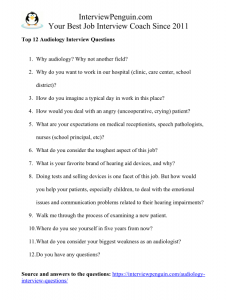The population is aging, and hearing loss and balance disorders are more prevalent than ever.
Bad news for most of us, but good news for you. Pursuing career in audiology (and earning your degree in the field), you not only set yourself up for one of the 50 highest paying jobs in the world, but also opted for a career which is projected to grow by 20% till 2030.
What does it all imply for your upcoming job interview, however? It means several things:
- Only a few people will compete with you for the vacancy in any hospital or audiology clinic. In some cases you can be the only job applicant–which obviously makes your task so much easier.
- You won’t typically deal with any tough technical questions. The hiring managers (your interviewers) will be concerned more about your motivation, goals, communication skills, and attitude to work.
- Succeeding in this interview isn’t particularly difficult, especially when compared to some other interviews in healthcare and pharma industry.
Let’s have a look at some questions you may face right on the big day.
Table of Contents
Why audiology? Why not another field?
Anything you talk about, try to talk about audiology (and your future career in it) with enthusiasm. They shouldn’t get an impression that you are in only for a big paycheck, and a prestigious job title your friends can envy you.
Some good answers I heard before include:
- You have a history of hearing or balance disorders in your family. Experiencing first hand how such troubles make a life of a person difficult, you were motivated you to choose audiology, and not another specialization in healthcare/pharma.
- You have a great role model in someone, an audiologist who treated you, or someone from your family who has the same career. Seeing how they help people and enjoy a great life-work balance that this profession offers, you decided for the same career path.
- More than anything else, you are aware of the trends in human society–population is aging, and not getting any healthier, and many people suffer from problems that audiologists can address. Hence you consider it a perspective career, and also a very important one for people, and decided to apply.
Why do you want to work in our hospital (clinic, care center, school district)?
Here you have a few options for a good answer. You can center your answer around their location. The place of work in nearby your apartment, or you have an excellent traffic connection to the place (and won’t spend hours commuting to and from work). Perhaps your children visit the schools in the district where you apply for the job.
Another alternative is praising their clinic. Maybe they do something exceptionally well, have the most modern equipment in place, great reputation among public, or even in the medical community. Simply something that makes them stand out in your eyes.
Third good option is saying that you have an excellent personal experience with the clinic (from the position of a patient), and so as soon as you saw their job advertisement, you went after it.
How do you imagine a typical day in work in this place?
This depends a lot on your place of work. Surely, you will always administer hearing tests, and collect information on the degree of impairment, using specialized instruments and equipment. You will fit and dispense hearing aids and other devices.
But whether you will have your own office, or travel from one place to another (for example to various schools in a school district) depends on your place of work. The same applies to the demographic group of your patients, or even to the types of tests you will administer.
Check the job description carefully, as well as the business hours of the clinic, their website and other things, to get a good picture of the job. In any case, ensure your interviewers that you expect to be busy, and work hard in your audiology practice.
How would you deal with an angry (uncooperative, crying) patient?
This is a question of your attitude. Ensure the interviewers that you understand the emotions and anxiety your patients may experience. Surely, you’ll deal with some uncooperative patients almost every day, and you count with this tough aspect of the job.
Perhaps you plan to approach each patient in a friendly way right from the start, helping them to calm down, to feel secure and welcome in your office.
You may explain them the entire procedure, why it is essential, and what benefits they’ll gain undergoing it. If they complain about something in particular (for example their hearing aid not working well), you’ll calmly listen to their complaint, and try to address the situation to their satisfaction.
Excellent customer service is essential for you, and therefor you won’t simply reproach the customer. Oppositely, you’ll try your best to help them control their emotions, and to cooperate with you. Your success rate won’t be 100%, and you count with some setbacks, but they won’t impact you negatively in your work.
Special Tip: You can also download the full list of questions in a one page long .PDF, print it, and practice your interview answers anytime later:

What are your expectations on medical receptionists, speech pathologists, nurses (school principal, etc)?
Depending on your place of work, and organization of the practice, you may cooperate with various other professionals. You may have a secretary, or a receptionist (she will work for more healthcare practitioners simultaneously), you may regularly talk to school principal or other administrators (when working in a school district), etc.
You have several ways of answering this question. In my opinion, the best one is saying that you have high expectations on one person only–on yourself. You prefer to focus on your job, trying to have good relationship with other colleagues, trying to understand how you can help them. But you have no expectations when it comes to their professional qualification or motivation in work. It’s simply not your business.
Another good idea is saying that you expect them to give you a chance, to provide honest (and critical) feedback on your work. Simply to help you become better in your profession. And perhaps that they are also receptive to your feedback…
Some other questions you may face in your audiologist interview
- What do you consider the toughest aspect of this job?
- What is your favorite brand of hearing aid devices, and why?
- Doing tests and selling devices is one facet of this job. But how would you help your patients, especially children, to deal with the emotional issues and communication problems related to their hearing impairments?
- Walk me through the process of examining a new patient.
- Where do you see yourself in five years from now?
- What do you consider your biggest weakness as an audiologist?
- Do you have any questions?
Conclusion and next step
Interview for a job of an audiologist belongs to easier interviews. You typically won’t compete for the job with many other candidates, and you should not get any extremely difficult technical questions. In four out of five cases, you’ll deal only with some personal and situational questions, just like we described in the article.
Remember that your non-verbal communication is essential. Speak with enthusiasm about your work, bring some positive energy to the interview room, and do not forget to do a proper research about your prospective employer.
Think about your interview answers for a while, and continue your preparation with InterviewPenguin.com, your best job interview coach since 2011, checking the following articles:
- How to deal with interview nerves
- Speech Language Pathology interview questions.
- Radiologist interview questions.


